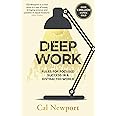
Digital Minimalism: Choosing a Focused Life in a Noisy World Paperback – 12 Mar. 2020
Description
Full description not available
Reviews
S**H
Inspiring Read
I genuinely couldn't put this book down. After realising that I needed to address my screen time, I decided to do something about it. I learnt that my screen time, at around 3 1/2 hours a day on my phone, and 30 odd unlocks, is actually pretty average, and that in times of stress and anxiety, my phone usage goes up. While it was a relief to know that I was average, I still wanted to address it a it was leaving me overwhelmed and lonely.I have three young children who are coming up to an age where some of their friends have phones and tablets and I want to set a good example for them too. This book really delves into the why behind our screen time, where so many other articles I've read just point out that it's an issue, but not the reasons we are compelled by our screens.I have already deleted everything on my phone that I can - no more social media or trashy news outlets. My phone usage went straight down from 3 and a half hours per day to less than half an hour. The book focuses a lot on what to do instead of starting at our phones, which I really liked - looking into the benefits of active downtime instead of passive downtime.The book doesn't teach you much you don't already know, but putting it all together in one very easy to read book is very compelling. It's definitely changed my days for the better and would recommend it to anyone that wants to take back control over their screen time.
T**A
philosophical approach to technology
I like large portions of this book because they expanded the thinking beyond the binary question: tech or not to tech.
D**E
Want a plan to monitor your social networking/browser/games usage on your mobile. Read this.
I read this book as an early adopter of Facebook, back when I loved in Scotland. Then when I found it, there was no or minimal advertising as I can remember. None of my friends used it that I was aware of, neither did any relatives At the time I had an account with the very popular MySpace, but I was growing disillusioned with the push for a much younger audience, so I encouraged others to go over to Facebook, with my explanation that it was also clean and uncluttered. In 2018, before the Cambridge Analytics scandal came to light, I permanently closed my Facebook account, believing Dr Jekyll had become Mr Hyde. To date I haven't gone back and have no intention of doing so. In 2020, I opened a Facebook Messenger account to communicate with a few people, although I was never comfortable with it. I had a WhatsApp account prior to Facebook buying them. Due to a change in my personal circumstances, I needed to change my Facebook Messenger photograph. When I created the TH account (without a Facebook account) it allowed me to add the photo, but now it wouldn't allow me to alter it - unless I opened a full Facebook account. Realising the con behind this, and still uncomfortable with anything Facebook, I closed my Facebook Messenger and my WhatsApp account as the con was created by the same company, Facebook incorporated. Having now finished this excellent book, it was the right decision for me. Read the book and you will make positive decisions in your personal or professional life. Maybe both!
J**
Frightening, enlightening and indispensable
Ultimately, the war, or 'resistance', against big tech's onslaught will only get harder as the entrenchment of their innovations becomes more and more baked into our daily lives. It's essential then, now more than ever, to ward against their enticements by beating the house at their own game, by stacking the upsides and negating the downsides of digital exposure. This book could be summed up with this phrase: 'be the master, not the slave'. It's not a treatise against technology or a luddite manifesto. It simply wants you to wrestle intentionality back from the tech overlords currently in control of your impulses.I'm old enough to remember Myspace. Since that time I've seen and felt the attendant secondary effects of social media's mass adoption rob much of the joy and spontaneity from daily life. For all the 'connectivity' we have reaped, the sacrifice to our mental health has been almost incalculable. The intended, or otherwise, goal of big tech then is to turn every human being into an atomised, addicted, socially deprived, anxious and alone, yet willingly loyal consumer. In this state you are most malleable to advertisers and therefore the most profitable to big tech. This book outlines in sober detail how our attention has the greatest minds in silicon valley martialed together in trying to own it, fracture it and possess it, by exploiting the natural human frailties we all feature. It's time we all viewed the internet as our slave and cultivated habits that keep it under our control, in a place where we can best exploit it. This book outlines just how to do it.This book is a natural accompaniment to the documentary 'The Social Dilemma'. I would advise readers to consume both this and that film. The film dramatises and details surveillance capitalism very well. However, this book provides a much more detailed and practical solution guide in placing and empowering us with the tools and responsibility to overcome the current catastrophe of big tech's monopolisation of our minds. Read it and reread it. It might be the most important book you read in a decade.
Common Questions
Trustpilot
5 days ago
3 weeks ago



